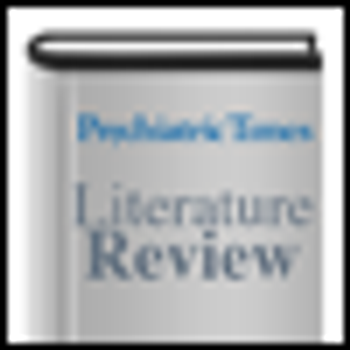
Patients with borderline personality disorder can present with multiple crises and minor incidents of self-harm or threats, but determining when the actions are true cause for concern can be a challenge.

Patients with borderline personality disorder can present with multiple crises and minor incidents of self-harm or threats, but determining when the actions are true cause for concern can be a challenge.

In this review, we discuss the established medications as well as experimental therapeutic options that may emerge as future medications for alcohol intoxication, withdrawal, and/or long-term abstinence maintenance or harm-reduced drinking.

Four studies sprang from the TORDIA trial on treatment-resistant depression in children and adolescents and showed that several factors influence treatment efficacy following treatment resistance.

Ringing the Bell to Save the Bereavement Exclusion.

A team approach, continually balancing the views of the psychopharmacologist, psychologist, social worker, family practice resident, and patient is the clinical Promised Land.

For psychiatrists, having even a basic idea of the potential-as well as of the perils-of social media is not only important to good practice, but it may be essential for a great practice.

Editor’s note: We are pleased to introduce Being a Therapist with this issue of Psychiatric Times. We hope you will enjoy the close-up views of these therapists.

What follows is an adaptation of Dr Ellis’s response to a volunteer who took part in a live public workshop demonstration of the Rational Emotive Behavior Therapy approach.

And when they see what I hide . . . up my white coat sleeve, . . . they understand that magic

Has any progress been made in our ability to manage negative symptoms of schizophrenia?

Using a question-and-answer format, we present a brief overview of issues that arise when mental health professionals explore how to best serve this population.

Review on the roles of gender in connection with premenstrual dysphoric disorder, OCD, psychosis, and other mental disorders.

Being male, female, or transgender exerts effects not only on anatomy and reproductive behaviors but also on immune mechanisms, pain perception, diet, occupation, social behaviors, and risk exposures.

A parent's heavy drinking can increase a child's risk of substance use disorder.

Abortion is not a pretty subject. An embryo or fetus, while not a fully developed person, has the potential to become one. No one is “pro-abortion.” At the same time, there are circumstances under which a girl or woman feels strongly that her pregnancy is untenable-that she is too young, too poor, too burdened, too ill to properly mother a child. Women have abortions because they take motherhood seriously.

Seventy percent of antidepressants are prescribed by primary care doctors with little training in their proper use, under intense pressure from Big Pharma, drug salespeople, and misled patients, after rushed 7-minute appointments and subject to no systematic auditing. The cash-strapped FDA is beholden to industry for funding. And it gets worse.

In schizophrenia therapy, the question arises whether a patient with hyper-religiosity as a main symptom can be treated with an antipsychotic (like clozapine) that targets that symptom.

Narcissistic personality disorder is largely understudied, in spite of clinicians' warnings that this is the most frequent presentation in patients.

In spite of a chronic mental illness (schizophrenia)and a psyche that increasingly blurred the boundaries between fantasy and reality, this lawyer and professor graduated from Vanderbilt with a perfect academic record.

Dr John C. Whitehorn shaped mental health policy at the national level, and his influence is still alive in his former residents and the young psychiatrists we have trained.

Psychiatry has much in common with dentistry. After all, long ago psychiatry threw its lot in with the rest of medicine-that is, general medicine, specialty medicine, and surgery.

What effect has the new antipsychotic Latuda had in patients with psychosis? Is a mood stabilizer as an adjunctive therapy necessary for schizophrenia or is the use of an antipsychotic alone sufficient?

The primary difference between malingering and factitious disorder is the question of motivation.

Our exchanges be marked by basic respect and civility-and by a willingness to take personal responsibility for what we say and how we say it. Physicians ought to be in the vanguard of such an Internet reformation.

With the recent tragedy in Colorado and the high likelihood that questions about psychiatry will be inextricably tied into it, guidance for practicing psychiatrists can be gleaned from this coincidence.

"Internet Addiction" may soon spread like wildfire. All the elements favoring fad generation are in place . . . the profusion of alarming books; the breathless articles in magazines and newspapers; extensive TV exposure; ubiquitous blogs; the springing up of unproven treatment programs; the availability of millions of potential patients; and an exuberant trumpeting by newly minted "thought leading" researchers and clinicians. So far, DSM-5 has provided the only restraint.

Anti-psychiatry proponents forget it is widely recognized that the DSM is a provisional diagnostic system pending progress in better understanding uniquely human disorders of our most complex organ.

When you have a strong team, you can provide quality mental health care and have an immensely satisfying career-even in the middle of a cornfield.

A common misconception about the history of mental illness is that, before Freud and psychoanalysis, there was no such thing as talk therapies or what is commonly known today as psychotherapy.

This tale involves a “clever” inmate. He enjoyed the respectable rung of bank robber, but found he had suddenly descended to approximately the level of a sex offender. The reason for his slippage was the inmate code, which demands allegiance to other inmates under virtually all circumstances. “Ratting out” a fellow inmate may cost one his life, or at the very least, result in a decidedly anxious, paranoid existence.